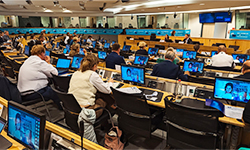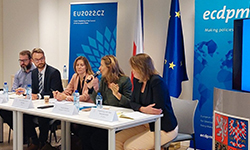BusinessEurope Headlines No. 2022-29
It’s time for the TTC to identify concrete deliverables

In preparation for the third ministerial-level meeting of the EU-U.S. Trade and Technology Council (TTC), BusinessEurope sent a letter to the European Commission Executive Vice-Presidents Dombrovskis and Vestager, presenting a few examples of priority areas for the European business community. Priorities for the TTC are: accelerating cooperation on emerging technologies; enhancing cooperation and dialogue on joint transatlantic 6G research cooperation; establishing transatlantic cooperation on semiconductors; strengthening cooperation on regulations and conformity assessments; coordinating the approach on export controls; improving trade and investment on climate and clean tech; and putting additional effort towards ensuring meaningful consultation with stakeholders. Beyond the work of the TTC, the key priority for European business remains improving the bilateral relationship across the Atlantic. The EU and the U.S. should effectively cooperate in different policy areas, including on energy-related challenges, on a global arrangement on sustainable steel and aluminium, on finding urgent and permanent solutions to the disputes on steel, aluminium, and civil aircrafts, and on reaching a swift conclusion of the "Trans-Atlantic Data Privacy Framework" as the successor to the EU-U.S. "Privacy Shield". Finally, BusinessEurope calls on the EU and the U.S. to work towards a negotiated solution as soon as possible to avoid a negative impact on bilateral trade following the adoption of measures by the U.S. to support the economy and reduce inflation.
![]() Contact: Catella Eleonora
Contact: Catella Eleonora
EU and UK Domestic Advisory Groups exchange views
 “Although changes in the regulatory framework governing EU-UK economic relations as of 1 January 2021 were significant, the EU-UK Trade and Cooperation Agreement (TCA) has mitigated major disruptions resulting from the end of the transition period. Since then, it has proven to be the cornerstone of EU-UK relations and we are convinced it can be a sound basis for deepening our ties in the future”, said Luisa Santos, Deputy Director General of BusinessEurope, at the joint meeting of the EU and UK Domestic Advisory Groups (DAGs) on 3 October 2022. The two groups were established under the TCA and are charged with monitoring the implementation of the agreement. This conference was the first meeting of the EU DAG and the UK DAG, and provided the members of the two bodies with an opportunity to exchange views on contemporary EU-UK relations. The two groups also adopted a joint statement at the end of their meeting, which was submitted to the European Commission and the UK government. The DAG-to-DAG meeting was followed on 4 October by the EU-UK Civil Society Forum, a platform for broader civil society to engage in a dialogue on the TCA with relevant EU and UK officials. Santos participated in both events in her capacity of Chair of the employers’ group and Vice-Chair of the EU DAG. “Finding solutions for the situation in Northern Ireland will be key for stabilising EU-UK relations. It will also allow both sides to deepen their cooperation in areas that are key for the future competitiveness of our businesses, such as regulatory cooperation, research and innovation, or education. In this regard, we welcome the willingness on both sides to continue their discussions on this issue”, she concluded.
“Although changes in the regulatory framework governing EU-UK economic relations as of 1 January 2021 were significant, the EU-UK Trade and Cooperation Agreement (TCA) has mitigated major disruptions resulting from the end of the transition period. Since then, it has proven to be the cornerstone of EU-UK relations and we are convinced it can be a sound basis for deepening our ties in the future”, said Luisa Santos, Deputy Director General of BusinessEurope, at the joint meeting of the EU and UK Domestic Advisory Groups (DAGs) on 3 October 2022. The two groups were established under the TCA and are charged with monitoring the implementation of the agreement. This conference was the first meeting of the EU DAG and the UK DAG, and provided the members of the two bodies with an opportunity to exchange views on contemporary EU-UK relations. The two groups also adopted a joint statement at the end of their meeting, which was submitted to the European Commission and the UK government. The DAG-to-DAG meeting was followed on 4 October by the EU-UK Civil Society Forum, a platform for broader civil society to engage in a dialogue on the TCA with relevant EU and UK officials. Santos participated in both events in her capacity of Chair of the employers’ group and Vice-Chair of the EU DAG. “Finding solutions for the situation in Northern Ireland will be key for stabilising EU-UK relations. It will also allow both sides to deepen their cooperation in areas that are key for the future competitiveness of our businesses, such as regulatory cooperation, research and innovation, or education. In this regard, we welcome the willingness on both sides to continue their discussions on this issue”, she concluded.
![]() Contact: Benedikt Wiedenhofer
Contact: Benedikt Wiedenhofer
Photo copyright: European Commission 2022
Supporting business investment during challenging times
 Policy-makers must look at ways in which viable businesses can be supported through the difficult times ahead. This was the message of BusinessEurope’s Economics Director, James Watson, at the European Banking Federation’s Banking Summit in Brussels on 29 September. He noted that with energy prices and interest rates rising, many companies are seeing profit margins squeezed, which makes essential investment in digital and green technologies more difficult. James argued that policy-makers can build confidence by setting out long-term regulatory frameworks that support investment and competitiveness. In particular, in the area of financial services, this means that the implementation in the EU of the final Basel III requirements must strengthen the resilience of the banking sector without resulting in significant increases in capital requirements.
Policy-makers must look at ways in which viable businesses can be supported through the difficult times ahead. This was the message of BusinessEurope’s Economics Director, James Watson, at the European Banking Federation’s Banking Summit in Brussels on 29 September. He noted that with energy prices and interest rates rising, many companies are seeing profit margins squeezed, which makes essential investment in digital and green technologies more difficult. James argued that policy-makers can build confidence by setting out long-term regulatory frameworks that support investment and competitiveness. In particular, in the area of financial services, this means that the implementation in the EU of the final Basel III requirements must strengthen the resilience of the banking sector without resulting in significant increases in capital requirements.
![]() Contact: Berggren Erik
Contact: Berggren Erik
Doing business in China: EU companies face mounting challenges
 “No doubt that the challenges and risks of European companies doing business in China have increased in recent years. Companies need to factor these mounting challenges in, as well as building supply chain resilience and ensuring global compliance. At the same time, EU-China cooperation continues to be crucial in certain areas”, said Luisa Santos, Deputy Director General of BusinessEurope, at an event she moderated on the launch of the 2022/2023 position paper of the European Union Chamber of Commerce in China (EUCCC) on 30 September. The event was co-organised by the Flanders-China Chamber of Commerce and the EUCCC. Joerg Wuttke, President of the EUCCC, presented the position paper and said that by prioritising ideology over economic concerns, China's business environment is becoming less predictable, less reliable and less economically attractive. “Opportunities for European companies remain, but they must now develop strategies to deal with an ever-growing list of risks stemming from both emerging legislation - within and outside of China - and geopolitical tensions”, he highlighted. For more information on EU-China relations, read BusinessEurope’s paper “EU-China relations – Engaging with a systemic rival”.
“No doubt that the challenges and risks of European companies doing business in China have increased in recent years. Companies need to factor these mounting challenges in, as well as building supply chain resilience and ensuring global compliance. At the same time, EU-China cooperation continues to be crucial in certain areas”, said Luisa Santos, Deputy Director General of BusinessEurope, at an event she moderated on the launch of the 2022/2023 position paper of the European Union Chamber of Commerce in China (EUCCC) on 30 September. The event was co-organised by the Flanders-China Chamber of Commerce and the EUCCC. Joerg Wuttke, President of the EUCCC, presented the position paper and said that by prioritising ideology over economic concerns, China's business environment is becoming less predictable, less reliable and less economically attractive. “Opportunities for European companies remain, but they must now develop strategies to deal with an ever-growing list of risks stemming from both emerging legislation - within and outside of China - and geopolitical tensions”, he highlighted. For more information on EU-China relations, read BusinessEurope’s paper “EU-China relations – Engaging with a systemic rival”.
![]() Contact: Elena Suárez
Contact: Elena Suárez
The state of the macroeconomy: an exchange of views with the European Central Bank
 All players need to be vigilant to the growth of inflationary expectations, and social partners need to engage responsibly in collective bargaining on wages and help ensure that temporary price rises do not give rise to a damaging wage-price spiral. This was a key message of BusinessEurope members during an exchange of views with Donata Faccia, representative of the European Central Bank (ECB) Brussels office, during BusinessEurope's Economic and Financial Committee on 5 October. As well as discussing the economic situation with the ECB, members also noted that businesses are currently playing an important role in dampening inflation pressures through absorbing increased input costs in margins, rather than passing the full costs on consumers, but are likely to be increasingly limited in their ability to do this. The results of the productive exchange will feed our Autumn Economic Outlook, scheduled for release in November.
All players need to be vigilant to the growth of inflationary expectations, and social partners need to engage responsibly in collective bargaining on wages and help ensure that temporary price rises do not give rise to a damaging wage-price spiral. This was a key message of BusinessEurope members during an exchange of views with Donata Faccia, representative of the European Central Bank (ECB) Brussels office, during BusinessEurope's Economic and Financial Committee on 5 October. As well as discussing the economic situation with the ECB, members also noted that businesses are currently playing an important role in dampening inflation pressures through absorbing increased input costs in margins, rather than passing the full costs on consumers, but are likely to be increasingly limited in their ability to do this. The results of the productive exchange will feed our Autumn Economic Outlook, scheduled for release in November.
Contact: Cornelius Hermelink
Enhancing the role of economic migration in reducing labour and skills shortages
 EU migration policy is at a crossroads. The rapid ageing of our population means that the need for third-country migrants has become a structural labour market need. In this context, the EU migration policy needs to be based on our labour market needs across Europe. It should support Member States in focusing on where the shortages of labour and skills are highest. To better inform the targeting of economic migrations to Europe, what will be crucial is to improve the coordination between the Member States to improve the design of national shortage occupations lists and of labour market tests. These were the key messages from Maxime Cerutti, BusinessEurope Director of Social Affairs, during a Czech presidency conference on “EU and Labour Migration: Needs, Strategies and Challenges”, which took place on 5-6 October. The upcoming pilot of the EU Talent Pool, and the launch of the full version next year, can play an important role in helping to match skilled third-country nationals with unfilled vacancies across the EU.
EU migration policy is at a crossroads. The rapid ageing of our population means that the need for third-country migrants has become a structural labour market need. In this context, the EU migration policy needs to be based on our labour market needs across Europe. It should support Member States in focusing on where the shortages of labour and skills are highest. To better inform the targeting of economic migrations to Europe, what will be crucial is to improve the coordination between the Member States to improve the design of national shortage occupations lists and of labour market tests. These were the key messages from Maxime Cerutti, BusinessEurope Director of Social Affairs, during a Czech presidency conference on “EU and Labour Migration: Needs, Strategies and Challenges”, which took place on 5-6 October. The upcoming pilot of the EU Talent Pool, and the launch of the full version next year, can play an important role in helping to match skilled third-country nationals with unfilled vacancies across the EU.
Contact: Robert Plummer
Development projects: clearer communication necessary for leveraging private sector
 “The EU has made many welcome efforts to engage the private sector in its development policy in recent years. However, there is still a lack of understanding as to how companies can benefit concretely from EU funding in this area and how they can contribute to EU development projects”, said Benedikt Wiedenhofer, Adviser in the international relations department of BusinessEurope, at the conference "How to Better Engage the European Private Sector in the EU Development Cooperation". The event, which was co-organised by the Czech Presidency of the Council of the EU and the Think Tank ECDPM on 29 September, brought together representatives of the EU institutions, Member States, development financing institutions, export credit agencies and the private sector. Experts exchanged on how the EU and its Member States can increase the complementarities between the tools at their disposal to better leverage the European private sector as an engine for sustainable development in partner countries. “In the future, communication on initiatives such as the Global Gateway needs to be much more targeted at companies and tell them clearly how they can contribute and whom they need to get in touch with for this purpose. Moreover, the EU and Member States will need to better integrate their trade policies, investment policies, and their trade and investment promotion efforts”, Wiedenhofer added.
“The EU has made many welcome efforts to engage the private sector in its development policy in recent years. However, there is still a lack of understanding as to how companies can benefit concretely from EU funding in this area and how they can contribute to EU development projects”, said Benedikt Wiedenhofer, Adviser in the international relations department of BusinessEurope, at the conference "How to Better Engage the European Private Sector in the EU Development Cooperation". The event, which was co-organised by the Czech Presidency of the Council of the EU and the Think Tank ECDPM on 29 September, brought together representatives of the EU institutions, Member States, development financing institutions, export credit agencies and the private sector. Experts exchanged on how the EU and its Member States can increase the complementarities between the tools at their disposal to better leverage the European private sector as an engine for sustainable development in partner countries. “In the future, communication on initiatives such as the Global Gateway needs to be much more targeted at companies and tell them clearly how they can contribute and whom they need to get in touch with for this purpose. Moreover, the EU and Member States will need to better integrate their trade policies, investment policies, and their trade and investment promotion efforts”, Wiedenhofer added.
Contact: Benedikt Wiedenhofer
Calendar 
- 10 October: Annual EU Budget Conference 2022
- 10-11 October: Tallinn Digital Summit 2022
- 12-14 October: European Forum for New Ideas 2022
- 7-18 November: United Nations Climate Change Conference 2022 (UNFCCC COP 27)
Not yet a subscriber? Register here.
Reminder: please have a look at our privacy policy